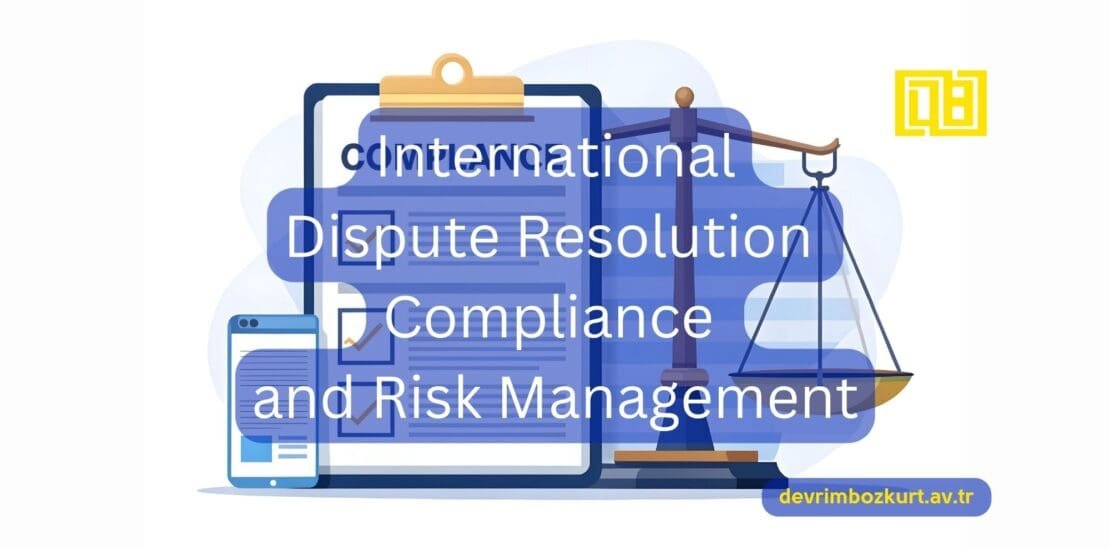International Dispute Resolution Compliance and Risk Management
- 7 Mart 2025
- Yayınlayan: Avukat Devrim Bozkurt
- Kategoriler: English, Guides, News & Articles

Strategies for Navigating and Ensuring Compliance with Global Laws
Introduction
In the increasingly interconnected global economy, businesses must navigate a complex web of international laws and regulations to ensure compliance and avoid legal pitfalls. Understanding and adhering to these laws is essential for maintaining ethical business practices and protecting the organization’s reputation. This article explores key areas of international law, including anti-corruption, antitrust, and data protection, and provides strategies for effective compliance and risk management.
Navigating International Anti-Corruption Laws
Anti-corruption laws are designed to prevent bribery and other forms of unethical conduct in business transactions. The most prominent international anti-corruption laws include the U.S. Foreign Corrupt Practices Act (FCPA), the UK Bribery Act, and the OECD Anti-Bribery Convention.
Understanding Key Anti-Corruption Laws
- FCPA: Enacted in 1977, the FCPA prohibits U.S. companies and individuals from bribing foreign officials to gain business advantages. It applies to all U.S. persons, including foreign subsidiaries of U.S. companies.
- UK Bribery Act: Introduced in 2010, this law is considered one of the strictest anti-corruption laws globally. It criminalizes both public and private sector bribery and applies to any company conducting business in the UK.
- OECD Anti-Bribery Convention: This international treaty aims to combat bribery of foreign public officials in international business transactions. It has been ratified by 44 countries, including major economies such as the U.S., UK, Germany, and Japan.
Strategies for Compliance
To ensure compliance with anti-corruption laws, businesses should implement robust internal controls and establish a comprehensive compliance program. Key strategies include:
- Risk Assessment: Conduct regular risk assessments to identify areas of potential corruption risk and implement appropriate mitigation measures.
- Training and Awareness: Provide training to employees and third parties on anti-corruption laws and the company’s anti-bribery policies.
- Due Diligence: Perform due diligence on business partners, agents, and third-party intermediaries to ensure they comply with anti-corruption standards.
- Monitoring and Auditing: Regularly monitor and audit business activities to detect and prevent corrupt practices.
Ensuring Compliance with International Antitrust Laws
Antitrust laws, also known as competition laws, promote fair competition and prevent monopolistic practices. Key international antitrust regulations include the U.S. Sherman Act, the EU Competition Law, and the Competition Act of Canada.
Understanding Key Antitrust Laws
- Sherman Act: Passed in 1890, the Sherman Act prohibits monopolistic practices and restricts agreements that restrain trade. It is enforced by the U.S. Department of Justice (DOJ) and the Federal Trade Commission (FTC).
- EU Competition Law: The European Union enforces competition rules to prevent anti-competitive practices, such as cartels, abuse of dominant positions, and anti-competitive mergers.
- Competition Act of Canada: This law aims to maintain and encourage competition in the Canadian marketplace and is enforced by the Competition Bureau of Canada.
Strategies for Compliance
To comply with antitrust laws, businesses should promote a culture of competition compliance and implement the following strategies:
- Compliance Policies: Develop and implement comprehensive antitrust compliance policies that outline acceptable business practices and prohibited conduct.
- Training Programs: Conduct regular training sessions for employees to educate them on antitrust laws and the company’s compliance policies.
- Internal Reporting Mechanisms: Establish mechanisms for employees to report suspected antitrust violations confidentially.
- Regular Audits: Perform regular audits and reviews of business practices to ensure compliance with antitrust regulations.
Adhering to International Data Protection Laws
Data protection laws are designed to safeguard individuals’ personal information and ensure privacy. Key international data protection regulations include the EU General Data Protection Regulation (GDPR), the U.S. California Consumer Privacy Act (CCPA), and Brazil’s General Data Protection Law (LGPD).
Understanding Key Data Protection Laws
- GDPR: Enforced since 2018, the GDPR is one of the world’s most comprehensive data protection laws. It applies to all organizations that process the personal data of EU residents, regardless of their location.
- CCPA: Effective from 2020, the CCPA grants California residents enhanced privacy rights and control over their personal information.
- LGPD: Brazil’s data protection law, in effect since 2020, regulates the processing of personal data and provides individuals with rights over their data.
Strategies for Compliance
To comply with data protection laws, businesses should implement robust data protection policies and procedures. Key strategies include:
- Data Mapping: Identify and document data flows within the organization to understand how personal data is collected, used, and stored.
- Privacy Policies: Develop and maintain clear privacy policies that inform individuals about their data rights and how their personal information is processed.
- Data Security Measures: Implement technical and organizational measures to protect personal data from unauthorized access, disclosure, and breaches.
- Data Subject Rights: Establish procedures to respond to data subject requests, such as access, rectification, and deletion of personal data.
Conclusion
Navigating and ensuring compliance with international laws and regulations, including anti-corruption, antitrust, and data protection laws, is vital for maintaining ethical business practices and avoiding legal pitfalls. By understanding key regulations and implementing effective compliance strategies, businesses can protect their reputation, foster a culture of integrity, and achieve long-term success in the global marketplace.







